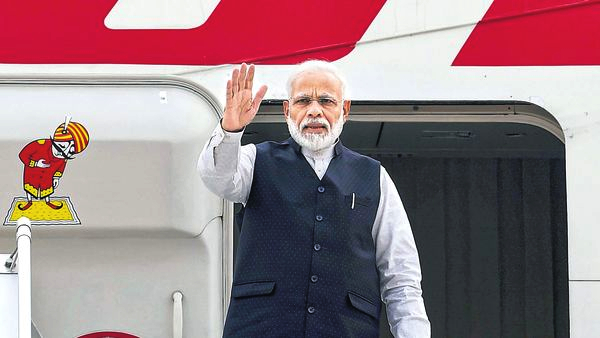New Delhi: Prime Minister Narendra Modi arrives in Brazil on Wednesday on a two-day visit to participate in the 11th Brazil-Russia-India-China-South Africa (BRICS) summit. This will be Modi’s sixth BRICS summit since he assumed office for the first time in May 2014. Brazil is the current chair of the grouping which taken together represents over 3.6 billion people, or half of the world population with a combined nominal GDP of $16.6 trillion.
Here’s a look at the key issues and possible takeaways expected from Modi’s visit to Brazil.
The Modi-Xi meet on the sidelines of the BRICS summit
Modi is scheduled to meet Chinese president Xi Jinping a little more than a week after India pulled out of a mega trade deal because of various reasons, including huge trade deficits with countries like China. The meeting between the two in Brasilia on Wednesday comes a month after the two leaders met at Mamallapuram near Chennai for their second informal summit. In Mamallapuram, the two leaders had agreed to set up a ministerial group headed by finance minister Nirmala Sitharaman on the Indian side and China’s Vice Premier Hu Chunhua to discuss trade, investment and services. India’s trade deficit with China stands at over $50 billion. New Delhi had worried that the joining the Regional Comprehensive Economic Partnership (RCEP) would mean opening the doors indirectly for more of Chinese goods to enter India through third countries. India and China are yet to announce dates for the first Hu-Sitharaman meeting that would also have discussed India’s concerns vis a via the deal. RCEP is a proposed free trade agreement (FTA) among 10 member-states of the Association of Southeast Asian Nations (ASEAN), and its six FTA partners, including China, India, South Korea, Japan, New Zealand and Australia to create one of the world’s biggest free trade areas. According to a second person familiar with the development, India and China could look at a bilateral understanding on an auto trigger mechanism coming into effect if imports from China surge beyond a point. Hu and Sitharaman could also discuss India’s concerns on rules of origin ie Chinese goods making their way into India through a third country. If India and China agree on these issues, they could be incorporated into the larger RCEP agreement which in turn could mean an opportunity for India to reconsider joining the pact. Besides Xi, Modi is also scheduled to hold bilateral talks Brazil’s president, Jair Bolsonaro. “Brazil and India share close and ever expanding bilateral relations, including in the spheres of defence, security, trade, agriculture, energy and space. Close cooperation between the two countries in multilateral forums has been a significant aspect of our strategic relationship,” Modi said in his departure statement. Modi’s visit to Brazil comes amidst media reports that Bolsonaro could be the chief guest at India’s Republic Day celebrations in January 2020.
BRICS Summit to focus on trade, digital economy:
According to Modi’s departure statement, India and the other BRICS economies will aim to strengthen cooperation in digital economy, science, technology and innovation. A BRICS MoU between Trade and Investment Promotion Agencies is expected to be signed at the conclusion of the summit besides the customary joint declaration that will lay out the future roadmap for cooperation among the five countries.
Terrorism:
A Key focus of the BRICS summit this year will be on cooperation on countering terrorism. Modi’s departure statement said that the five countries will aim to “build mechanisms for counter-terrorism cooperation within the BRICS framework.” According to senior officials of the Indian foreign ministry, the year the BRICS joint working group on counter-terrorism has decided to constitute five sub working groups on counterterrorism in the areas of terrorist financing, use of Internet for terrorist purposes, countering radicalization, issue of foreign terrorist fighters and capacity-building. India is expected to be named the chair of the subgroup on use of internet for terrorist purposes.
Source: LM
Image Courtesy:Live Mint
You may also like
-
IAF Aircraft Set Course For Exercise Eastern Bridge VII At Oman
-
India-us Working Together In Areas Like Critical Minerals, Supply Chains And Advanced Technologies: Shri Piyush Goyal
-
Defence Secretary to co-chair 5th India-Philippines Joint Defence Cooperation Committee meeting in Manila
-
2nd India-Japan Finance Dialogue held in Tokyo on 6th September, 2024
-
Prime Minister, Shri Narendra Modi welcomes Crown Prince of Abu Dhabi
